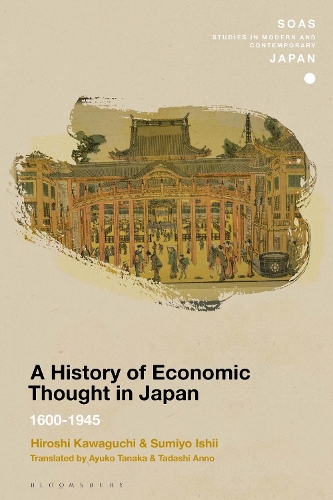
A History of Economic Thought in Japan: 1600 - 1945
(Paperback)
Available Formats
Publishing Details
A History of Economic Thought in Japan: 1600 - 1945
By (Author) Hiroshi Kawaguchi
By (author) Sumiyo Ishii
Translated by Ayuko Tanaka
Translated by Tadashi Anno
Bloomsbury Publishing PLC
Bloomsbury Academic
27th July 2023
United Kingdom
Classifications
Tertiary Education
Non Fiction
Economic history
330.952
Physical Properties
Paperback
288
Width 154mm, Height 232mm, Spine 18mm
520g
Description
This ground-breaking book provides the first English-language survey of economic thought in modern Japan. Significantly, it offers both a detailed study of economic thought from 1600 to 1945 and a nuanced analysis of Western and Asian perspectives on the field of Japanese economic history. Expertly translated from Japanese and written by leading scholars in the field, this exciting study includes: * A novel approach to economic thought which contextualizes the core values of thinkers across the period * A comparative analysis of Japanese economic history which looks at the continuities across the Meiji divide * The extensive use of archival sources, many of which were previously unavailable in English A History of Economic Thought in Japan, 1600 - 1945 serves as a case study of how Western economic ideas spread to non-Western regions and interacted with indigenous ideas. It will therefore be of immense value to both scholars of economic thought and those seeking a deeper understanding of the moral, intellectual, and societal forces that shaped modern Japan.
Reviews
History of Economic Thought in Japan not only provides an excellent introduction to economic thought in Japan and Japanese economic history more broadly, but also works well in rethinking and reframing issues in economic history and theory for historians who may be uncomfortable (or too comfortable) within the prevalent frames of English-language economic history. * H-Net Reviews *
An important recasting of early modern and modern Japanese history from the perspective of economic theory. * CHOICE *
Economic thinking in Japan emerged in a historically unique and distinctive way, and A History of Economic Thought in Japan provides the first full account in English. It is written by well known specialists and has sold widely in Japan. The translation is professionally and beautifully done. By describing not only the development of market thinking but also de-marketization and ideas of a stationary society, the authors analysis will also resonate with current thinking about post-growth economics. * Mark Metzler, Senior Historian of Modern Japan, University of Washington, USA *
Kawaguchi and Ishiis survey of Japanese economic thought courageously straddles the early-modern and the modern periods, when the usual approach is to stay on one side or the other and thereby exile early-modern ideas to obscure academic circles or suborn them to preparation for the modern transition. The authors identify core values on either side of the divide: early-modern concerns with personal and social moral perfection and modern concerns with sacrifice for a competitive pursuit of wealth to bolster the nation. With the balance in coverage, the survey achieves a historicization and relativization of modern values, while also pointing out continuities and similarities of ideas over centuries. We need such surveys so that we can re-assess where we have come from and where we are going. * James B. Lewis, Associate Professor of Korean History, University of Oxford, UK *
Author Bio
Hiroshi Kawaguchi is Professor of History of Japanese Economy and Economic Thought at Waseda University, Japan. Sumiyo Ishii is Associate Professor of History of Japanese Economic Thought at Daito Bunka University, Japan. Ayuko Tanaka is Translator of Academic Texts. With Tadashi Anno she has translated Economic Thought in Early Modern Japan (2010) and From Leavenworth to Lhasa: Living in a Revolutionary Era (2008). Tadashi Anno is Professor of Political Science at Sophia University, Japan. He is the author of National Identity and the Search for Great-Power Status in Russia and Japan (2018) and the co-editor of The Dynamism of Global Society (2007).
